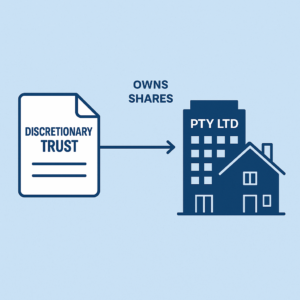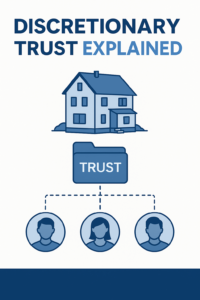Company Business Structure in Australia
A company is one of the most common and trusted business structures in Australia.
It is a separate legal entity, meaning the company itself can own assets, incur debt, enter contracts, and be sued — separate from its owners.
This structure offers limited liability protection, making it ideal for growing businesses, startups, and enterprises seeking credibility, scalability, and investment opportunities.
What a Company Structure Means
When you set up a company, you’re creating a legal entity that exists independently from you as an individual.
The company can operate under its own name, with its own Australian Company Number (ACN) and Australian Business Number (ABN).
The owners of a company are called shareholders, and the people who manage it are called directors.
Shareholders invest capital and receive profits (dividends), while directors control daily business operations and ensure compliance with the Corporations Act 2001.
A company must be registered with the Australian Securities and Investments Commission (ASIC) and must comply with ASIC’s ongoing reporting and governance requirements.
Types of Companies in Australia
There are several types of companies, but the most common for small to medium businesses is the proprietary limited company (Pty Ltd).
-
Proprietary Limited (Pty Ltd): Privately owned, limited to 50 shareholders, and not listed on the stock exchange.
-
Public Company: Can offer shares to the public and list on the Australian Securities Exchange (ASX).
-
Not-for-Profit or Limited by Guarantee Company: Used by charities and associations.
For most small businesses, a Pty Ltd company provides the best balance between protection and control.
Advantages
✅ Limited Liability
Shareholders are not personally liable for company debts beyond the value of their shares.
✅ Separate Legal Entity
The company can own property, enter contracts, and sue or be sued in its own name.
✅ Tax Advantages
Companies pay a flat tax rate (generally 25% for base rate entities), which may be lower than individual tax rates.
✅ Professional Image
A company structure often enhances credibility with banks, clients, and investors.
✅ Scalability
Easier to raise capital, add shareholders, or bring in partners as the business grows.
Disadvantages
⚠️ Setup and Ongoing Costs
Companies cost more to establish and require annual ASIC fees and professional compliance services.
⚠️ Complex Reporting Requirements
Directors must keep proper records, prepare financial statements, and lodge annual reports and tax returns.
⚠️ Director Responsibilities
Directors have legal duties and can be held personally liable if they breach their obligations.
⚠️ Less Flexibility with Profits
Unlike a trust, profits can’t be distributed freely — they must follow share ownership.
⚠️ Potential for Double Taxation
Dividends paid to shareholders may be taxed again at the individual level (though franking credits help offset this).
When a Company Structure Is Suitable
A company structure may be right for you when:
-
You plan to grow or scale your business.
-
You want to limit your personal liability.
-
You need to attract investors or partners.
-
Your business generates substantial revenue.
-
You want a structure that provides a professional image and long-term growth potential.
Companies are often the preferred structure for startups, contracting businesses, investment ventures, and professional service firms.
Key Obligations
To operate a company in Australia, you must:
-
Register with ASIC and obtain an ACN.
-
Register an ABN and business name (if required).
-
Appoint directors and shareholders.
-
Maintain financial records and lodge company tax returns annually.
-
Pay annual ASIC review fees and notify ASIC of any changes.
-
Comply with director duties under the Corporations Act 2001.
Trustify Tip: Always use a qualified accountant or business advisor to manage ASIC compliance and tax obligations — penalties for late lodgements or director breaches can be significant.
Summary
A company business structure offers strong legal protection, tax efficiency, and growth opportunities.
It’s ideal for businesses looking to expand, manage risk, and attract investors — but it comes with added compliance and cost.
Choosing to operate as a company is a major step toward establishing a credible, scalable, and sustainable business.
Information current as of October 2025. Reviewed by the Trustify Business Advisory Team. General information only — not financial or legal advice.
Others
-
October 20, 2025 Buying Property Under Your Personal Name in Australia: Pros and Cons
-
October 18, 2025 Service Trust Business Structure in Australia




